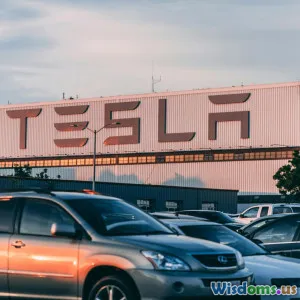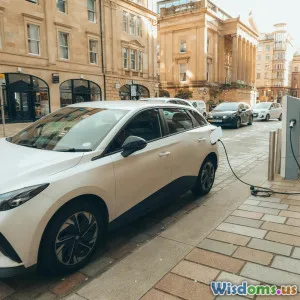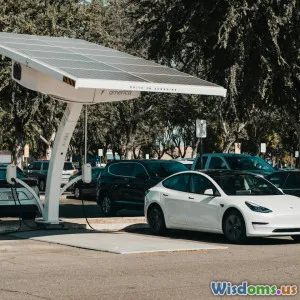
Emerging Technologies in Transportation
7 min read Explore how emerging transportation technologies are revolutionizing mobility with innovations like EVs, autonomous cars, and hyperloops. (0 Reviews)
Emerging Technologies in Transportation: Driving the Future of Mobility
Transportation is undergoing a transformation unlike any seen before. From the hum of electric motors replacing combustion engines to vehicles capable of driving themselves, emerging technologies are not just enhancing mobility—they are redefining it. In this article, we dive into the most promising transportation innovations reshaping how people and goods move, promising greater efficiency, sustainability, and safety.
1. Electric Vehicles (EVs): Revolutionizing Road Transport
Electric vehicles (EVs) have gone from niche green experiments to mainstream road stars. Advances in battery technology, chiefly lithium-ion improvements, have reduced costs and extended range, making EVs more accessible.
- Key Developments: Tesla’s Model 3 famously broke barriers by combining performance, affordability, and range, with over 350 miles on a single charge.
- Impact on Environment: According to the International Energy Agency (IEA), switching from internal combustion engine cars to EVs can reduce tailpipe emissions by up to 70% in countries with clean electricity grids.
- Government Incentives: Nations worldwide, such as Norway, incentivize EV purchases through tax breaks, leading to EVs representing over 80% of new car sales nationally.
Beyond passenger cars, electric trucks, buses, and even motorcycles are entering fleets, cutting urban pollution dramatically.
2. Autonomous Vehicles (AVs): Machines Behind the Wheel
Self-driving cars showcase how artificial intelligence (AI) and machine learning can greatly enhance transportation safety and efficiency.
- Technology Stack: Combining LIDAR sensors, computer vision, radar, and ultra-precise mapping, advanced driver-assistance systems (ADAS) contribute to making Level 4/5 autonomy a reality.
- Real-World Trials: Waymo has logged millions of autonomous miles across various U.S. cities, while companies like Cruise and Aurora aim to commercialize driverless taxis and delivery vehicles soon.
The rollout of AVs is projected to reduce traffic accidents—in which human error accounts for 90% according to the National Highway Traffic Safety Administration (NHTSA)—leading to safer roads.
3. Hyperloop: High-Speed Ground Transport Reinvented
Re imagined by Elon Musk in 2013, the hyperloop concept proposes ultra-fast transit through near-vacuum tubes, potentially transporting passengers or freight at speeds over 700 miles per hour.
- Current Developments: Virgin Hyperloop successfully tested passenger pods attaining speeds up to 240 mph in Nevada, demonstrating the system’s feasibility.
- Geographical Promise: Hyperloops could dramatically reduce travel times, such as from Los Angeles to San Francisco in under 30 minutes, challenging air travel’s supremacy.
Challenges still include infrastructure costs and regulatory frameworks, but the potential to revolutionize inter-city transit has garnered global interest with projects across the U.S., Europe, and Asia.
4. Connected and Smart Infrastructure: The Backbone of Modern Transport
Emerging transportation technologies don't stop at vehicles; intelligent infrastructure is critical to maximizing system benefits.
- Vehicle-to-Everything (V2X) Communication: Enabling cars to communicate with each other, traffic lights, and road sensors helps prevent accidents and optimizes traffic flow.
- Smart Traffic Management: AI-powered systems analyze live traffic data to synchronize traffic lights and reduce congestion, exemplified by Singapore's intelligent transportation system saving millions of hours annually.
These digital backbone enhancements enable smoother, more adaptive transport ecosystems.
5. Alternative and Sustainable Fuels: Beyond Batteries
While EVs dominate much of the narrative, other alternative fuel technologies are important, especially for heavy transport.
- Hydrogen Fuel Cells: Vehicles convert hydrogen gas into electricity emitting only water vapor. Companies like Toyota (Mirai) and Hyundai (Nexo) have commercial fuel-cell vehicles offering quick refuels and long ranges.
- Biofuels and Synthetic Fuels: Made from organic matter or synthesized chemically, these fuels aim to reduce carbon footprints by utilizing sustainable raw materials.
In aviation and shipping, where battery energy density can be lacking, such fuels present promising sustainability pathways.
Conclusion: Transforming the Mobility Landscape
Emerging transportation technologies are unlocking pathways toward safer, cleaner, and more efficient mobility. Electric vehicles reduce urban emissions and dependence on fossil fuels. Autonomous systems promise lifesaving automation and comfort. Hyperloop concepts envision revolutionary transit speeds, while connected infrastructure optimizes every journey.
However, this future depends on continued innovation, regulatory support, and societal acceptance. The transportation sector plays a critical role in tackling climate change, improving safety, and bridging economic divides.
As these technologies mature, they usher society into a new era of mobility—one defined by smart, sustainable, and seamless transport solutions reshaping how we live, work, and explore the world.
References:
- International Energy Agency (IEA) EV Reports
- National Highway Traffic Safety Administration (NHTSA) Traffic Safety Facts
- Virgin Hyperloop Test Results
- Singapore Land Transport Authority’s Intelligent Transport System Review
- Toyota and Hyundai Fuel Cell Vehicle Data
With informed choices and continued advancements, the road ahead for transportation gleams bright – full of promise, innovation, and possibility.
Rate the Post
User Reviews
Popular Posts


















